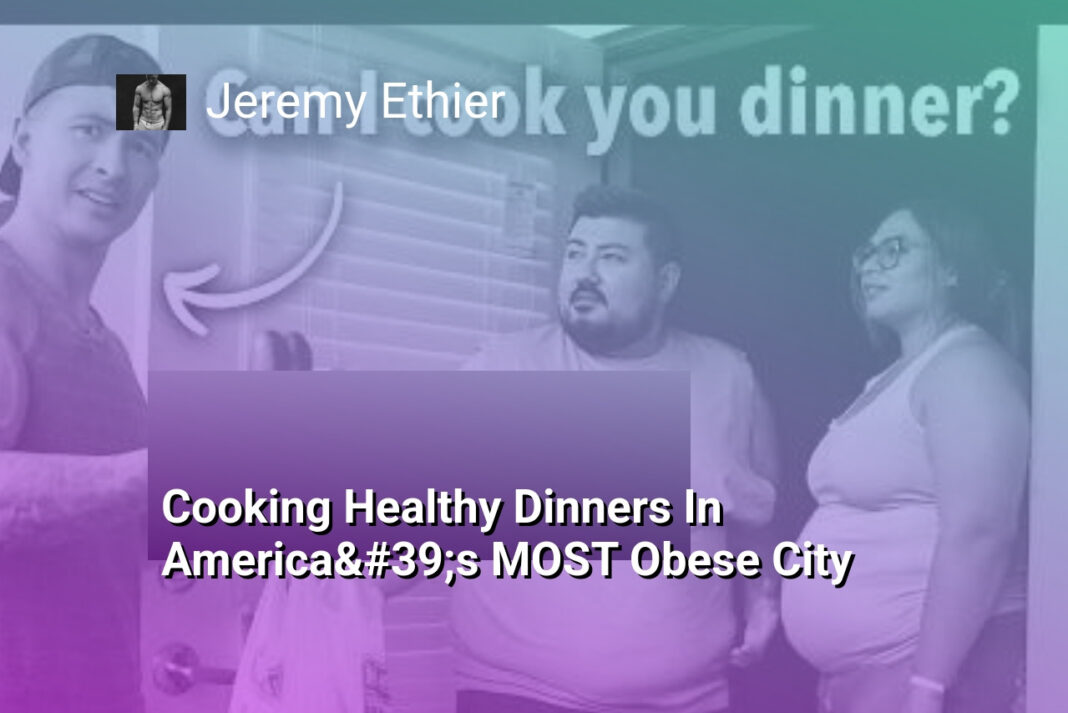The Bottom Line:
- As a health-focused documentarian, I explored McAllen, Texas, a city grappling with significant obesity challenges and unhealthy dietary patterns.
- I discovered that local food culture predominantly features oversized, processed meals, which contribute to widespread health complications.
- By collaborating with a local dietician, I aimed to demonstrate how nutritious meals can be both affordable and delicious, challenging community perceptions about healthy eating.
- The city’s car-dependent infrastructure and sedentary lifestyle further compound health risks, making nutrition education critically important.
- Through a community workshop and meal preparation, I successfully engaged locals in understanding and embracing healthier lifestyle choices, proving that meaningful dietary transformation is possible.
McAllen’s Hidden Health Crisis: Understanding Obesity Rates
The Stark Reality of Weight-Related Health Challenges
McAllen faces a profound obesity epidemic that extends far beyond simple statistics. Recent health data reveals that nearly 40% of adults in the region are clinically obese, significantly higher than the national average. This alarming trend is not just a number but represents real human experiences of chronic health risks, including diabetes, cardiovascular disease, and reduced life expectancy. The combination of cultural dietary habits, sedentary urban design, and limited access to nutritional education creates a complex landscape of health challenges.
Socioeconomic Factors Driving Obesity Rates
The obesity crisis in McAllen is deeply intertwined with socioeconomic dynamics. Low-income neighborhoods often lack fresh produce markets and affordable healthy food options, creating what nutritionists call “food deserts.” Fast food and processed meal alternatives become the most accessible and economical choices for many families. Additionally, the car-centric urban infrastructure discourages physical activity, with limited walking paths and public spaces that promote movement. These systemic barriers make weight management an uphill battle for residents, particularly those with limited financial resources.
Cultural and Dietary Transformation Opportunities
Despite the challenging landscape, McAllen demonstrates significant potential for nutritional revolution. Community engagement and targeted educational programs can play a crucial role in shifting dietary perspectives. Local initiatives focusing on culturally relevant healthy cooking, affordable nutrition workshops, and collaborative efforts between healthcare professionals, community leaders, and residents can create sustainable change. The key lies in understanding that transformation isn’t about radical diet restrictions but about reimagining food culture, making nutritious meals both delicious and accessible to all community members.
Breaking the Cycle: Nutrition Education and Meal Strategies
Empowering Nutritional Knowledge
Understanding nutrition goes beyond simply knowing what foods to eat. In McAllen, where obesity rates are critically high, comprehensive nutrition education becomes a transformative tool. Local residents need practical, culturally relevant information that breaks down complex dietary concepts into actionable strategies. By focusing on accessible learning methods, community members can develop sustainable eating habits that support long-term health and wellness.
Strategic Meal Planning Techniques
Effective meal planning serves as a cornerstone for dietary transformation. Residents can learn to create balanced meals that are both nutritious and budget-friendly, similar to the $5 per person chicken fajitas with roasted vegetables demonstrated in community workshops. The key is developing skills to select whole foods, understand portion control, and prepare meals that are satisfying yet calorie-conscious. Local partnerships with nutrition experts and meal preparation services like Fork to Fit can provide crucial guidance and support in this process.
Overcoming Cultural and Environmental Barriers
McAllen’s car-centric environment and existing food culture present significant challenges to healthy eating. Nutrition education must address these systemic barriers by offering culturally sensitive strategies that respect local culinary traditions while introducing healthier alternatives. Workshops and community programs can help residents navigate these challenges, teaching them how to make informed food choices that align with their lifestyle and health goals. By creating a supportive ecosystem of knowledge and resources, the community can gradually shift towards more nutritious eating patterns that combat obesity and promote overall well-being.
Community Engagement: Shifting Perceptions About Healthy Eating
Breaking Cultural Food Barriers
In McAllen, transforming dietary habits requires understanding deeply rooted cultural connections to food. Traditional meals often represent more than nutrition—they symbolize family, heritage, and community celebration. By reimagining these culinary traditions through a health-conscious lens, residents can maintain cultural authenticity while improving nutritional intake. Local chefs and nutritionists are collaborating to develop recipes that honor traditional flavors while reducing excessive calories and processed ingredients.
Grassroots Education and Empowerment
Community workshops and interactive cooking demonstrations have emerged as powerful tools for nutritional education. These sessions go beyond lecturing about dietary guidelines, instead providing hands-on experiences that demystify healthy cooking. Participants learn practical skills like portion control, ingredient substitution, and budget-friendly meal planning. Local healthcare professionals and community leaders are actively involved, lending credibility and personal connection to these educational initiatives.
Transforming Public Spaces and Accessibility
Addressing obesity requires more than individual behavior change—it demands systemic environmental modifications. Community leaders are advocating for increased walking paths, farmers markets, and accessible grocery stores offering fresh, affordable produce. Local businesses are being encouraged to provide healthier menu options, and schools are revising meal programs to prioritize nutritional quality. These comprehensive approaches recognize that sustainable health transformations occur when entire community infrastructures support wellness goals.
Practical Solutions: Budget-Friendly Nutritious Meal Preparation
Smart Shopping: Maximizing Nutrition on a Budget
Navigating grocery stores strategically can dramatically reduce meal preparation costs while maintaining high nutritional value. Focus on purchasing seasonal produce, which tends to be more affordable and fresher. Bulk purchasing of proteins like chicken, beans, and eggs can significantly cut expenses. Consider store-brand alternatives for staple ingredients like rice, quinoa, and canned vegetables, which often provide identical nutritional profiles at lower prices. Local markets in McAllen frequently offer discounted fresh produce, enabling residents to access nutrient-rich ingredients without straining their budgets.
Meal Prepping Techniques for Time and Cost Efficiency
Implementing batch cooking strategies can transform nutritional habits while minimizing daily preparation time. Dedicate one afternoon per week to preparing multiple meals that can be portioned and stored. Utilize slow cookers and instant pots to create large quantities of nutritious dishes like lean protein stews, vegetable-rich chilis, and grain-based casseroles. These methods not only save money by reducing food waste but also provide convenient, healthy meal options throughout the week. Invest in quality food storage containers to maintain meal freshness and make transportation to work or school seamless.
Balancing Flavor and Nutrition Without Breaking the Bank
Creating delicious, health-conscious meals doesn’t require expensive ingredients or complex techniques. Experiment with affordable spice blends and herbs to elevate simple dishes. Incorporate protein-rich legumes like black beans and lentils, which are cost-effective alternatives to meat. Roasting vegetables with minimal olive oil and seasoning can transform basic ingredients into flavorful, nutrient-dense meals. Learn to repurpose leftovers creatively, turning roasted chicken into salads or stir-fries, maximizing ingredient utility and preventing food waste. By understanding basic cooking techniques and ingredient substitutions, McAllen residents can develop sustainable, budget-friendly nutritional habits that support long-term health goals.
Empowering Locals: From Awareness to Sustainable Lifestyle Changes
Breaking Nutritional Misconceptions
Community members in McAllen often perceive healthy eating as bland, expensive, and time-consuming. This perception creates significant barriers to adopting nutritious dietary habits. By demonstrating that nutritious meals can be delicious, affordable, and simple to prepare, local initiatives can transform these deeply ingrained beliefs. Practical cooking demonstrations that showcase budget-friendly recipes like chicken fajitas with roasted vegetables help deconstruct myths about healthy eating, proving that nutritional wellness doesn’t require complex culinary skills or substantial financial investment.
Educational Pathways to Wellness
Targeted nutrition workshops play a crucial role in empowering residents to make informed dietary choices. These educational platforms provide practical knowledge about portion control, understanding nutritional labels, and creating balanced meals that align with individual health goals. By collaborating with local healthcare professionals like dieticians, these workshops can offer personalized guidance tailored to the unique metabolic challenges prevalent in the McAllen community. Interactive sessions that include hands-on cooking lessons, nutritional assessments, and group discussions create a supportive environment for sustainable lifestyle transformations.
Community-Driven Health Transformation
Sustainable health changes require a holistic approach that extends beyond individual interventions. Engaging local businesses, healthcare providers, and community leaders creates a comprehensive support network that reinforces healthy living principles. Initiatives like partnering with local restaurants to offer nutritionally balanced menu options, developing walking groups, and creating accessible fitness programs can systematically address the sedentary lifestyle and dietary challenges specific to McAllen. By fostering a community-wide commitment to wellness, residents can collectively work towards reducing obesity rates and improving overall public health outcomes.





